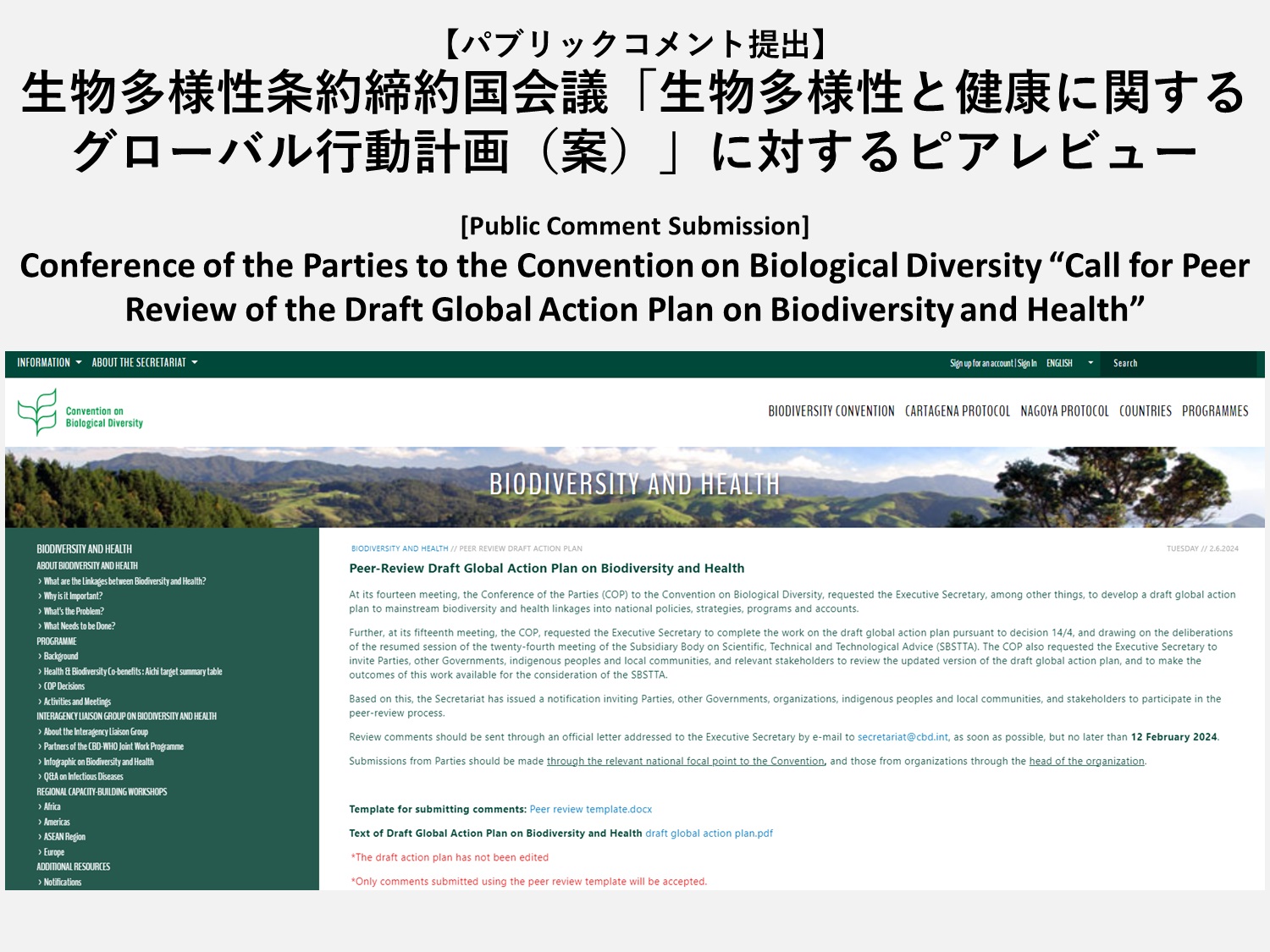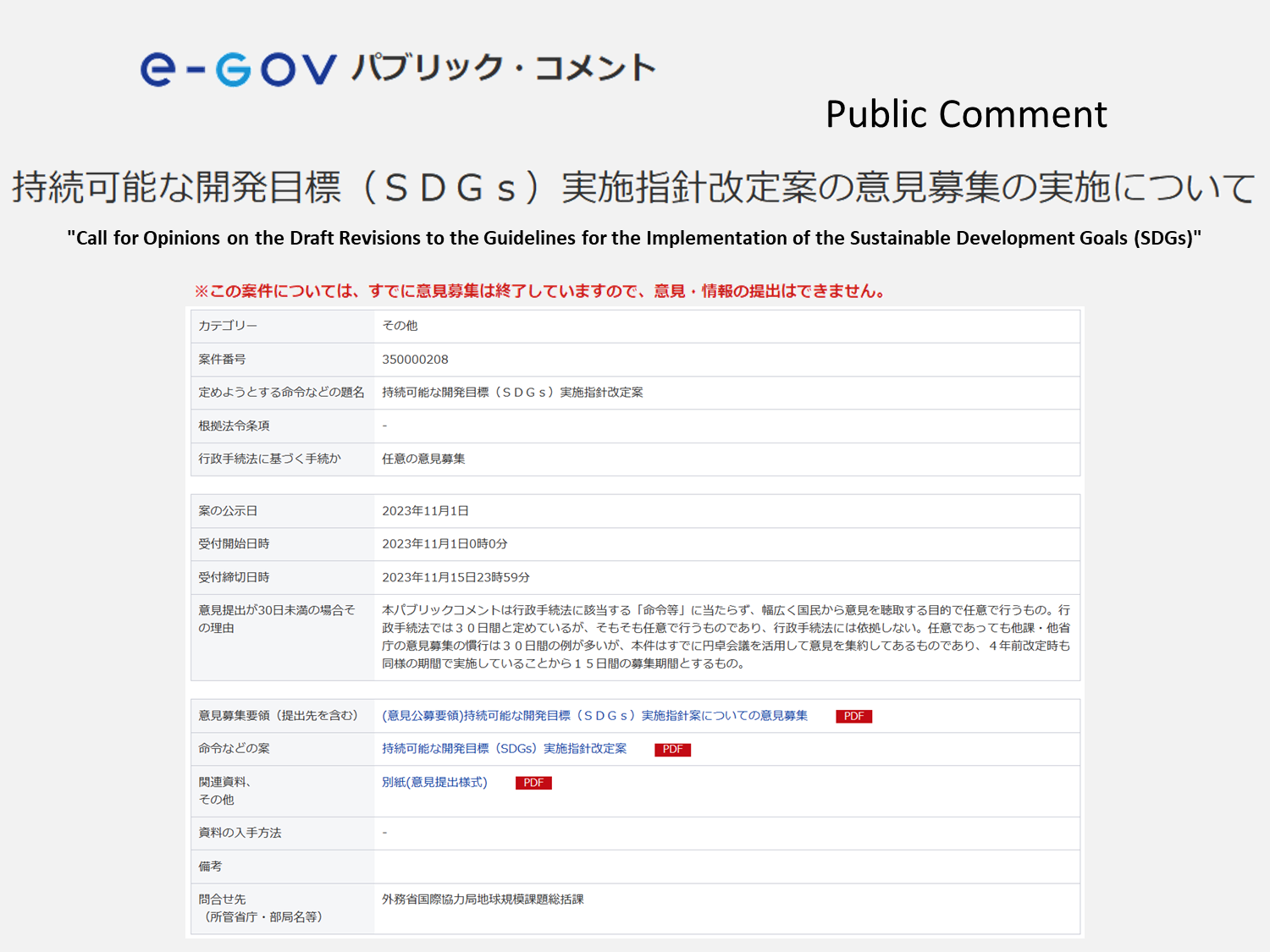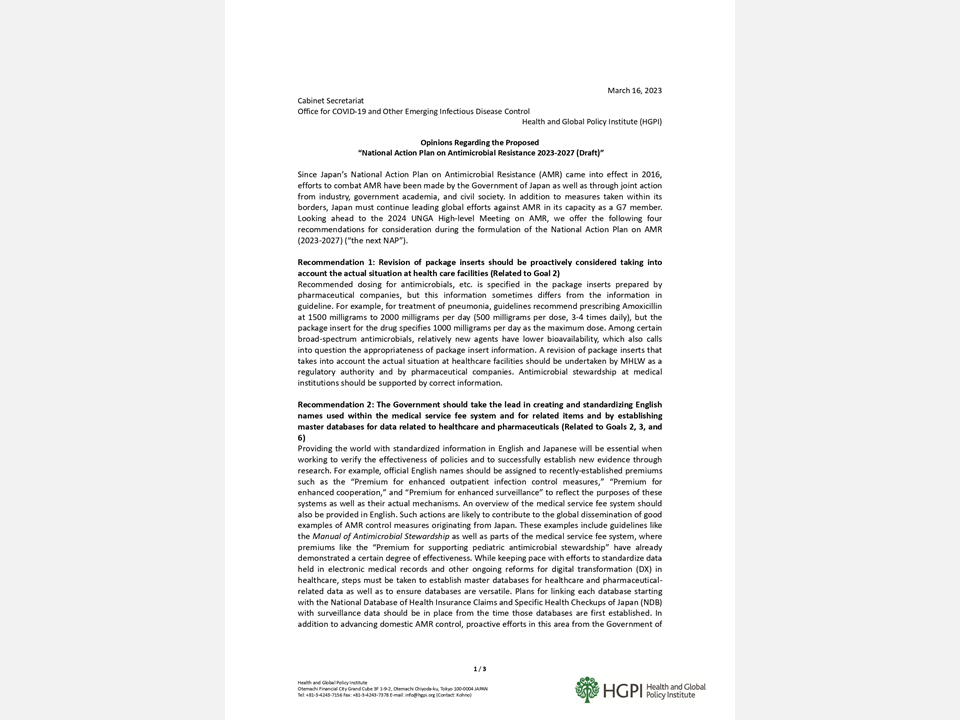[Public Comment Submission] “The Basic Policy for Environmental Conservation Activities, Encouragement of Willingness for Environmental Conservation, Environmental Education, and Promotion of Collaborative Efforts” (March 1, 2024)
date : 3/8/2024
Tags: AMR, Planetary Health
![[Public Comment Submission] “The Basic Policy for Environmental Conservation Activities, Encouragement of Willingness for Environmental Conservation, Environmental Education, and Promotion of Collaborative Efforts” (March 1, 2024)](https://hgpi.org/en/wp-content/uploads/sites/2/HGPI_240301_ENVeyecatch.jpg)
Health and Global Policy Institute’s Planetary Health Team and Antimicrobial Resistance (AMR) Team submitted their written opinion on the draft of “The Basic Policy for Environmental Conservation Activities, Encouragement of Willingness for Environmental Conservation, Environmental Education, and Promotion of Collaborative Efforts” by the General Policy Division of the Minister’s Secretariat within the Ministry of the Environment.
Advancing environmental conservation activities contribute to developing a sustainable society, and it is important to encourage willingness for activities through efforts such as environmental education. Mutual collaboration between citizens, corporations, private bodies, and the State as well as local governments is also meaningful in environmental conservation. In June 2011, “The Law for Enhancing Motivation on Environmental Conservation and Promoting of Environmental Education” (“the Law”) was announced, which aimed to further promote environmental conservation activities and environmental education.
In June 2012, the Cabinet decided “The Basic Policy for Environmental Conservation Activities, Encouragement of Willingness for Environmental Conservation, Environmental Education, and Promotion of Collaborative Efforts” (“the Basic Policy”) based on the Law., The Basic Policy is to be reviewed roughly every five years and amendment is under consideration.
The public comment includes the following perspectives:
- Regarding environmental conservation and environmental education including in higher education and jobs, it is essential to consider viewpoints on linkage between humans, animals and the ecosystem, namely “planetary health”, which includes the “One-Health Approach”.
- The global crisis of climate change, biodiversity loss, and pollution interacts with economic and social challenges and adversely affects the health of humans and animals by an increase of emerging/re-emerging infectious diseases, particularly AMR, zoonotic diseases spillover such as bird influenza and febrile illness mediated by ticks and mosquitoes.
- The Programme for International Student Assessment (PISA) for 15-year-old students, which is offered by the Organization of Economic Cooperation and Development (OECD), will contain questions about the interconnectedness between humans and the ecosystem in the next 2025 version and should be utilized in environmental education.
- Universities, graduate schools, and research institutions have the core function of linking industry, government, academia, and citizens and should promote decarbonization of themselves and interdisciplinary education and research.
- The State and local Governments should lead by example in environmental conservation activities, develop criteria to evaluate and praise advanced activities of corporations and private bodies and build awareness among investors and shareholders as well as citizens.
For more information on this public comment, please click here. (only available in Japanese)
Top Research & Recommendations Posts
- [Policy Recommendations] Developing a National Health and Climate Strategy for Japan (June 26, 2024)
- [Research Report] The 2023 Public Opinion Survey on Satisfaction in Healthcare in Japan and Healthcare Applications of Generative AI (January 11, 2024)
- [Research Report] Survey of Japanese Nursing Professionals Regarding Climate Change and Health (Final Version) (November 14, 2024)
- [Policy Recommendations] Integrating Climate and Health for a Sustainable Society: Incorporating a Planetary Health Perspective into Nationally Determined Contributions (NDCs)(December 9, 2024)
- [Announcement] A Turning Point Towards Building Green Healthcare Systems (June 5, 2024)
- [Policy Recommendations] Obesity Control Promotion Project 2023 “The Next Steps for Engaging and Cooperating with Patients, Citizens, and Communities for Implements of Obesity Control Measurements” (April 8, 2024)
- [Research Report] Survey of Japanese Physicians Regarding Climate Change and Health (December 3, 2023)
- [Policy Recommendations] The Women’s Health Promotion Project “Policy proposal for Promotion of Menopausal Women’s Health as a Social Issue to be Considered by Industry, Government, Academia and the Private Sector” (July 31, 2024)
- [Reserch Report] Antimicrobial Resistance (AMR) Measures in Sweden (November 21, 2024)
- [Research Report] Building a Mental Health Program for Children and Measuring its Effectiveness (June 16, 2022)
Featured Posts
-
2024-11-25
[Registration Open] (Webinar) The 130th HGPI Seminar “Marking a Decade of the Act on Medical Care for Patients With Intractable Diseases: Connecting Intractable Diseases and Society From the Perspective of a Media Professional and Family Member” (January 28, 2025)
![[Registration Open] (Webinar) The 130th HGPI Seminar “Marking a Decade of the Act on Medical Care for Patients With Intractable Diseases: Connecting Intractable Diseases and Society From the Perspective of a Media Professional and Family Member” (January 28, 2025)](https://hgpi.org/en/wp-content/uploads/sites/2/hs130-top_JPNENG-1.png)
-
2024-11-29
[Registration Open] (Webinar) The 129th HGPI Seminar “The Connection Between Planetary Environment and Human Health as Seen Through the JECS and Future Expectations” (December 23, 2024)
![[Registration Open] (Webinar) The 129th HGPI Seminar “The Connection Between Planetary Environment and Human Health as Seen Through the JECS and Future Expectations” (December 23, 2024)](https://hgpi.org/en/wp-content/uploads/sites/2/hs129-top.png)
-
2024-12-09
[Policy Recommendations] Integrating Climate and Health for a Sustainable Society: Incorporating a Planetary Health Perspective into Nationally Determined Contributions (NDCs)(December 9, 2024)
![[Policy Recommendations] Integrating Climate and Health for a Sustainable Society: Incorporating a Planetary Health Perspective into Nationally Determined Contributions (NDCs)(December 9, 2024)](https://hgpi.org/en/wp-content/uploads/sites/2/160f1c0c260ce6021440137773571fc9.png)
-
2024-12-12
[HGPI Policy Column] (No. 51) From the Planetary Health Project “Part 11: Efforts Toward Achieving Carbon Neutrality in Japan’s Pharmaceutical Industry”
![[HGPI Policy Column] (No. 51) From the Planetary Health Project “Part 11: Efforts Toward Achieving Carbon Neutrality in Japan’s Pharmaceutical Industry”](https://hgpi.org/en/wp-content/uploads/sites/2/HGPI_20241206_PolicyColumn_eyecatch.png)
-
2024-12-18
[Policy Recommendations] Policy Recommendations on Strengthening CKD Strategies for Workers: The Importance of Providing Early Detection, Intervention, and Support Through Screenings and Medical Visits (October 28, 2024)
![[Policy Recommendations] Policy Recommendations on Strengthening CKD Strategies for Workers: The Importance of Providing Early Detection, Intervention, and Support Through Screenings and Medical Visits (October 28, 2024)](https://hgpi.org/en/wp-content/uploads/sites/2/HGPI_20241023_FY2024CKD_eyecatch.jpg)







